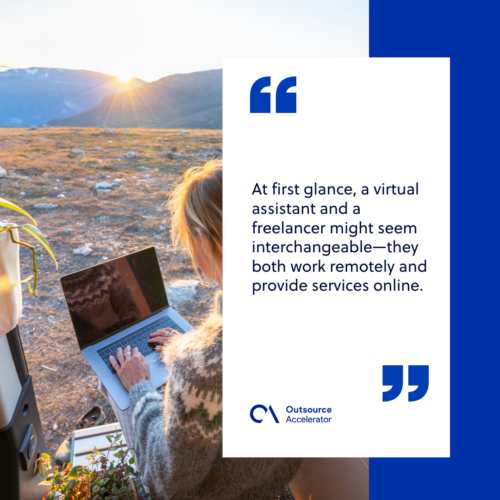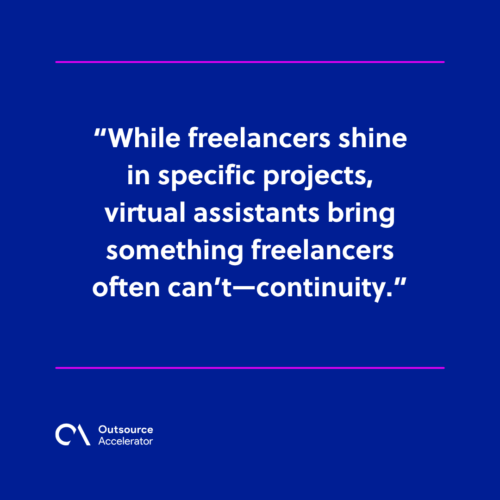Virtual Assistant vs. Freelancer: Choosing the right remote talent to hire

As your business grows, so does your to-do list. Suddenly, your core team is juggling admin tasks, follow-ups, and endless projects that pull them away from high-impact work.
That’s when many SMEs turn to remote talent for support. But here’s where things get tricky: should you bring on a virtual assistant to handle daily operations, or hire a freelancer for specialized projects?
Both can help your business run smoother—but in the debate of virtual assistant vs. freelancer, the best choice depends on how you plan to scale.
Virtual assistant vs. Freelancer: Understanding the roles
Remote work continues to expand. It’s estimated that remote workers in the US work an average of 2.3 days offsite. This created the field for VAs and freelancers, even opening the doors to international hires.
At first glance, a virtual assistant and a freelancer might seem interchangeable—they both work remotely and provide services online. But dig a little deeper, and you’ll find key differences in their scope, commitment, and work style.
A virtual assistant (VA) is typically a long-term team member who supports your day-to-day operations.
Think of them as your remote right-hand person—someone who can handle administrative tasks, manage schedules, respond to emails, coordinate projects, or even oversee customer service. They don’t just complete tasks; they help run parts of your business.
A freelancer, on the other hand, is usually a specialist hired for short-term or project-based work.
They might design your new logo, build a website, or write content for your next campaign. Freelancers are experts in their field, but they’re not necessarily embedded in your daily workflow.

Key differences between a virtual assistant and a freelancer
Let’s get to the heart of the virtual assistant vs. freelancer debate—their key differences.
1. Scope and commitment
A virtual assistant’s role is ongoing and multi-dimensional. They adapt to your business needs, learn your systems, and grow alongside your company.
Freelancers, meanwhile, focus on specific deliverables—once a project is done, so is the partnership.
2. Work relationship and communication
Virtual assistants often work directly under your guidance, functioning as part of your internal team, especially if you source from platforms like VirtualStaff.ph. You can train them, give feedback, and build rapport over time.
Freelancers tend to be more independent—they prefer clear briefs and minimal supervision.
3. Cost and payment structure
Both virtual assistants and freelancers can be cost-effective compared to local hires, but their payment models differ.
Virtual assistants usually charge hourly or monthly rates, providing steady support. Freelancers often charge per project, which can add up quickly if you have frequent one-off needs.
4. Reliability and availability
Because virtual assistants work with you regularly, they’re more likely to be available when you need them.
Freelancers may be juggling multiple clients, so getting immediate responses or quick turnarounds can be challenging.
5. Skill diversity
Virtual assistants are generalists who can handle a wide range of administrative, creative, or technical tasks.
Freelancers are specialists—you hire them for one thing, and they’ll deliver it with precision.
Here’s a quick summary:
| Virtual Assistant | Freelancer | |
| Scope and commitment | Ongoing, multi-dimensional | Project-based, specific |
| Work relationship | Integrated, team member | Independent, minimal oversight |
| Communication | Direct, trainable | Clear briefs, less supervision |
| Cost and payment | Hourly or monthly rates | Per project, variable |
| Reliability and availability | Regular, dependable | Juggling clients, less available |
| Skill diversity | Broad, generalist | Specialized, expert |
When to hire a virtual assistant vs a freelancer
So, when should you hire a virtual assistant, and when does it make more sense to hire a freelancer?
Hire a virtual assistant when:
- You need ongoing administrative or operational support.
- You want someone to handle repetitive but important tasks like email management, scheduling, or customer service.
- You’re looking for a reliable remote team member who understands your business inside and out.
Hire a freelancer when:
- You have a one-time project, such as designing a logo, writing website content, or setting up automation tools.
- You need specialized expertise that falls outside your core team’s skill set.
- You prefer short-term contracts and defined project scopes.
Both roles have value—but if your goal is to build consistency and efficiency in your operations, a virtual assistant often delivers greater long-term impact.
Why choosing a virtual assistant can be the smarter move
While freelancers shine in specific projects, virtual assistants bring something freelancers often can’t—continuity.
A great virtual assistant becomes part of your company’s rhythm. They learn your preferences, anticipate your needs, and improve processes over time. You don’t have to constantly re-explain your systems or worry about handovers between projects.
Another huge advantage? Dependability. Virtual assistants are more invested in your success because they’re in it for the long haul. They provide steady support, communicate regularly, and take ownership of their tasks.
If you’re scaling your business or battling to regain control of your time, hiring a virtual assistant isn’t just a convenience; it’s a critical strategy. They become the backbone of your remote operation, ensuring daily tasks keep flowing smoothly while you focus entirely on driving growth.

Build your team with VirtualStaff.ph
If you’ve decided that a virtual assistant is the right fit for your business, finding the right one shouldn’t be complicated.
Your search ends with VirtualStaff.ph — a trusted platform that connects businesses with skilled Filipino professionals across industries. Whether you need administrative support, customer service, bookkeeping, or marketing help, you’ll find reliable full-time staff ready to work with you remotely.
What makes the platform different is the VirtualStaff Seat — a plug-and-play system that takes the stress out of hiring and managing remote staff. You manage the workday, and the VirtualStaff Seat takes care of the rest, handling onboarding, attendance, and payroll in the background so you can focus on running your business.
Many companies start with just one or two VirtualStaff Seats, then scale to ten or more as their teams grow. It’s a smarter, simpler way to build a reliable support team without the overhead or complexity of traditional hiring.
With VirtualStaff.ph, you get the best of both worlds — the flexibility of remote work and the stability of dedicated full-time staff, all managed inside one easy-to-use system.
Forget simply “finding help.” Start scaling your business today with the VirtualStaff Seat — a plug-and-play system to hire reliable full-time staff that’s helping companies worldwide grow faster and operate more profitably.







 Independent
Independent




